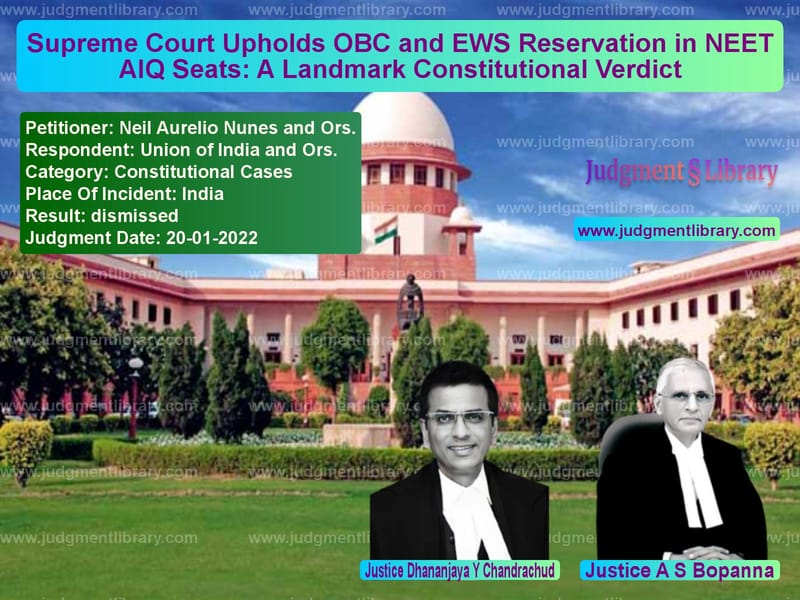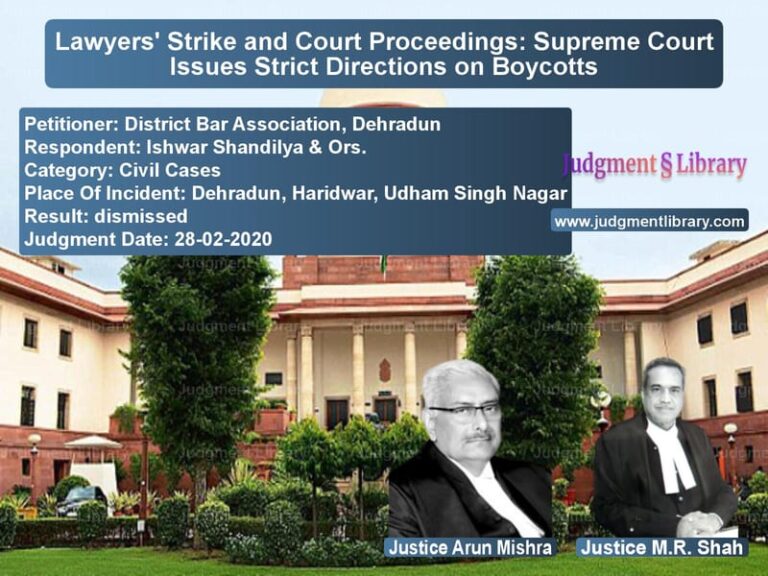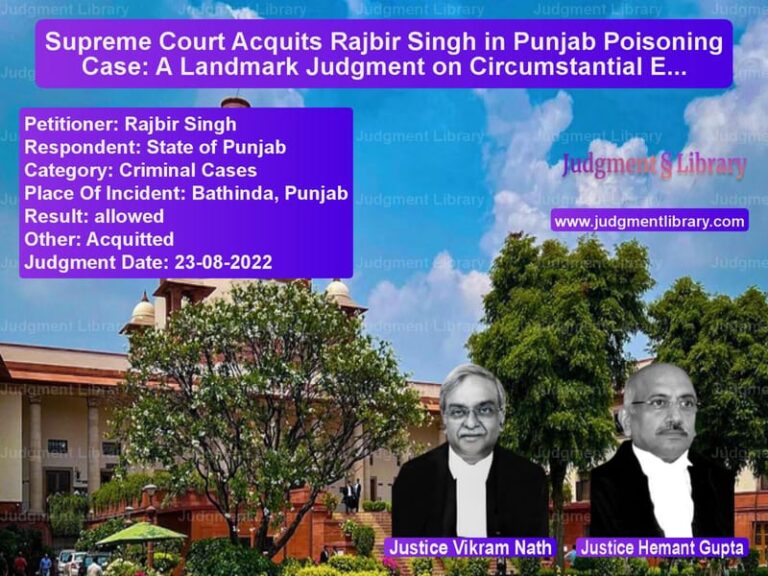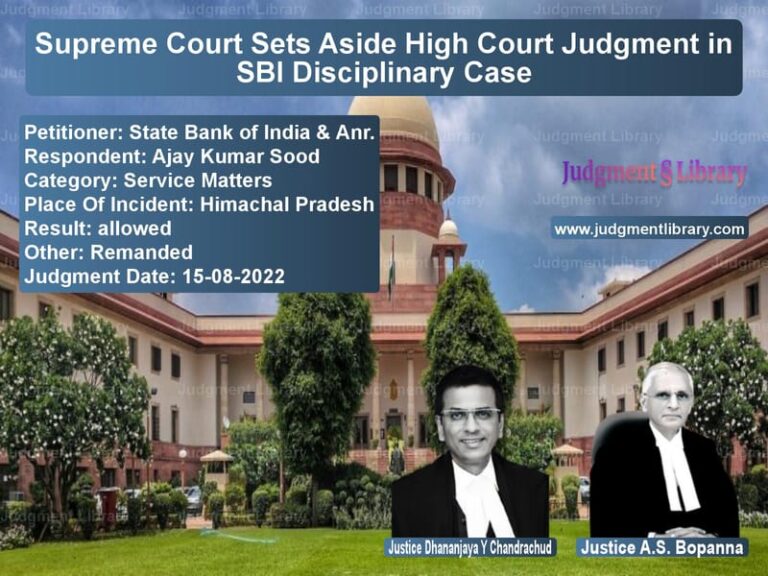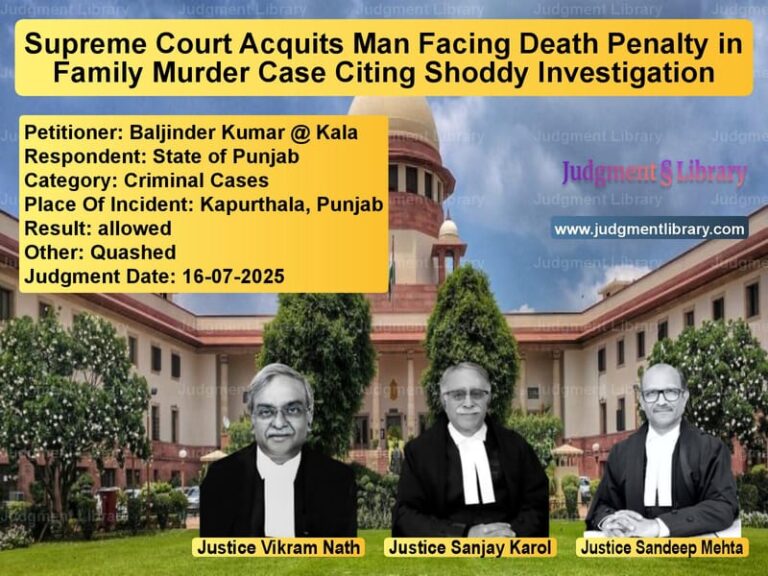Supreme Court Upholds OBC and EWS Reservation in NEET AIQ Seats: A Landmark Constitutional Verdict
The Supreme Court’s ruling in Neil Aurelio Nunes & Ors. v. Union of India & Ors. is a historic judgment that upholds the reservation for Other Backward Classes (OBC) and Economically Weaker Sections (EWS) in the All-India Quota (AIQ) seats for medical and dental admissions through NEET. The Court addressed constitutional concerns, clarified the meaning of merit in the context of reservation, and reinforced the role of the executive in policy decisions. The ruling has widespread implications for education policy, affirmative action, and the interpretation of equality under the Indian Constitution.
Background of the Case
The case originated from a notification issued on July 29, 2021, by the Union Government, which provided:
- 27% reservation for OBCs (Non-Creamy Layer) in AIQ seats for medical and dental undergraduate (UG) and postgraduate (PG) admissions.
- 10% reservation for EWS candidates in AIQ seats under the 103rd Constitutional Amendment.
The petitioners, medical aspirants, challenged this notification on the following grounds:
- Reservation in AIQ seats had not been implemented before, and its introduction violated previous Supreme Court rulings.
- The criteria for EWS reservation, particularly the income threshold of Rs. 8 lakh, was arbitrary and lacked a sound basis.
- Changing the reservation policy after the NEET-PG registration process had already commenced violated the legal principle that “rules of the game cannot be changed midway.”
Legal Issues Considered
The Supreme Court analyzed three critical legal questions:
- Was the introduction of OBC and EWS reservations in AIQ seats constitutionally valid?
- Was the Rs. 8 lakh income threshold for EWS category legally sound?
- Did the reservation policy disrupt the fairness of the admission process by altering criteria after the exam was conducted?
Supreme Court’s Observations on OBC Reservation
The Supreme Court upheld the 27% reservation for OBCs in AIQ seats, making several key observations:
- Substantive Equality and Affirmative Action: The Court reiterated that Articles 15(4) and 15(5) are integral to the right to equality under Article 14. The Constitution permits affirmative action to correct historical disadvantages.
- Merit Must Be Socially Contextualized: The Court rejected the argument that merit should be determined solely based on examination scores, stating that merit should account for socio-economic disadvantages.
- AIQ Seats Were Meant to Overcome Domicile-Based Restrictions: The original purpose of AIQ was to ensure a fair distribution of medical seats across states. The Court clarified that its previous rulings in Pradeep Jain v. Union of India (1984) and Dinesh Kumar v. Motilal Nehru Medical College (1985) did not prohibit reservations.
- Executive’s Authority in Policy Decisions: The government has the authority to introduce reservations in AIQ without prior judicial approval. The Court emphasized that unless a policy is “manifestly arbitrary,” courts should not interfere.
Supreme Court’s Observations on EWS Reservation
On the 10% EWS reservation, the Court took a slightly different approach. While it upheld the reservation for the current academic year (2021-22), it acknowledged concerns regarding the criteria, especially the Rs. 8 lakh income threshold.
- Validity of the 103rd Constitutional Amendment: The Court reaffirmed that EWS reservation is constitutionally valid, as upheld in Janhit Abhiyan v. Union of India.
- Income Threshold Under Scrutiny: The Court noted that the Rs. 8 lakh limit was borrowed from the OBC creamy layer criteria but serves a different purpose.
- Pandey Committee Report: The government had constituted a committee to review the EWS criteria, which recommended retaining the Rs. 8 lakh limit but removing the asset-based eligibility conditions.
Judicial Review of Reservation Policies
The Court clarified that reservation is a matter of policy and should not be interfered with unless it is “manifestly arbitrary” or unconstitutional. It further stated that courts should not substitute their own views for the wisdom of the executive in policy matters.
Final Judgment
The Court ruled:
- The 27% OBC reservation in AIQ seats is constitutionally valid and shall continue.
- The 10% EWS reservation is upheld for the current academic year (2021-22), but its criteria will be reviewed in March 2022.
- The reservation policy did not amount to “changing the rules of the game” since it was finalized before the counseling process commenced.
Implications of the Judgment
This ruling has far-reaching consequences for educational policy and affirmative action in India.
- Strengthening Affirmative Action: The judgment reinforces the need for reservations to address socio-economic inequalities.
- Reaffirming Judicial Restraint in Policy Matters: The Court set a precedent that courts should not interfere with policy decisions unless they violate constitutional principles.
- Impact on Future Admissions: The judgment paves the way for a broader debate on the implementation of EWS reservations across various sectors.
- Defining Merit Beyond Examinations: By contextualizing merit in the framework of social justice, the ruling expands the definition of merit beyond competitive exam scores.
Conclusion
The Supreme Court’s decision in Neil Aurelio Nunes & Ors. v. Union of India & Ors. is a landmark ruling that balances merit and affirmative action. It upholds the principle that competitive examinations alone cannot determine merit without considering social disadvantages. By validating OBC and EWS reservations in AIQ seats, the Court has reinforced the role of substantive equality in India’s education system.
Petitioner Name: Neil Aurelio Nunes and Ors..Respondent Name: Union of India and Ors..Judgment By: Justice Dhananjaya Y Chandrachud, Justice A S Bopanna.Place Of Incident: India.Judgment Date: 20-01-2022.
Don’t miss out on the full details! Download the complete judgment in PDF format below and gain valuable insights instantly!
Download Judgment: neil-aurelio-nunes-a-vs-union-of-india-and-o-supreme-court-of-india-judgment-dated-20-01-2022.pdf
Directly Download Judgment: Directly download this Judgment
See all petitions in Fundamental Rights
See all petitions in Constitution Interpretation
See all petitions in Public Interest Litigation
See all petitions in Judgment by Dhananjaya Y Chandrachud
See all petitions in Judgment by A. S. Bopanna
See all petitions in dismissed
See all petitions in supreme court of India judgments January 2022
See all petitions in 2022 judgments
See all posts in Constitutional Cases Category
See all allowed petitions in Constitutional Cases Category
See all Dismissed petitions in Constitutional Cases Category
See all partially allowed petitions in Constitutional Cases Category

